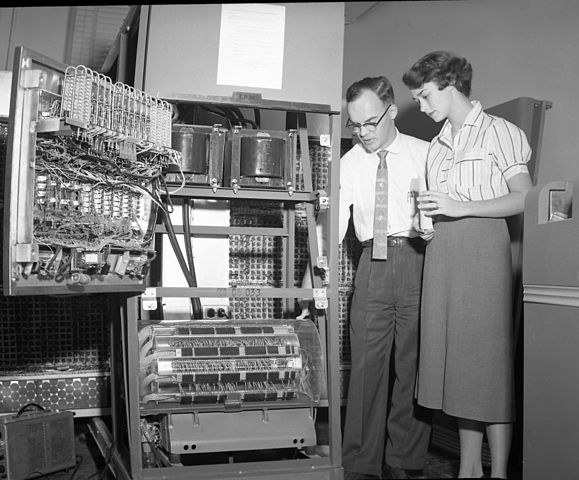The Origin Of L’Ordinateur – Computers In French Posted by John Bauer on Apr 26, 2017 in Vocabulary
New technologies comme (like) the Internet and computers need new words to describe them. Those new words either comes from adaptations of older words or are completely new inventions. One such word is computer in French: ordinateur.
Le nom (the noun) computer comes from le verbe (the verb) to compute, which originally comes from the French word compter, which then comes from Latin: computare.
Computare → Compter → To Compute → Computer
The original meaning of to compute has the same meaning as the modern French word compter: to count or add up.
In English, le mot (the word) computer was used to describe people who performed calculations more than any machine for most of son histoire (its history). With the new inventions of the 20th century le mot began to take on a new meaning as new electronic machines began making complicated calculations more than computers.
In 1955, l’entreprise (the company) IBM brought a new computer and le mot ordinateur to France. They needed a word for the device and l’entreprise could have simply used the English word, especially since the word compter is already un mot français, but they decided to create something new instead.
François Girard, le responsable du service publicité (the head of the advertising department) at IBM France, thought that computer was too similar to calculatrice (calculator) and wanted to find a better name for « la nouvelle machine électronique destinée au traitement de l’information (the new electronic machine intended for information processing) » .
In an effort to find un bon nom français (a good french name), François Girard asked son ancien professeur de lettres (his old humanities professor), Jacques Perret, for advice.
Monsieur Perret had a suggestion based on a rare word, ordonnateur: someone who puts things in order. Le mot comes from le verbe ordonner, meaning to put in order, to order, to arrange, which comes from le mot latin: ordinare.
Monsieur Perret’s idea was more cumbersome than the final word: ordinatrice électronique.
Eventually, IBM settled on ordinateur as le mot for the new product. Au début (at first), l’entreprise wanted to keep le mot ordinateur as a trademark, but l’ordinateur became too popular and entered la langue française as a normal word.
Ordinare → Ordonner → Ordonnateur → Ordinateur
L’histoire behind l’ordinateur gives us an interesting look into how new words are developed. It can be a bit confusing at times, but I find seeing l’etymologie (the etymology) makes it easier to remember du vocabulaire. If I know l’histoire and can arrange everything in my head it’s like remembering a thrilling story instead of a vocabulary list!
Looking up l’origine (the origin) of les mots is also much less embarrassing than not knowing how to say something au magasin!

Build vocabulary, practice pronunciation, and more with Transparent Language Online. Available anytime, anywhere, on any device.





Comments:
Bruce:
C’était un article très intéressant. Je vous remercie.